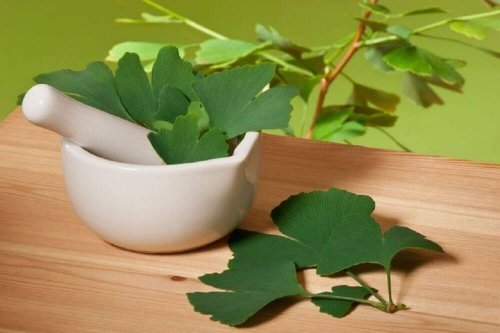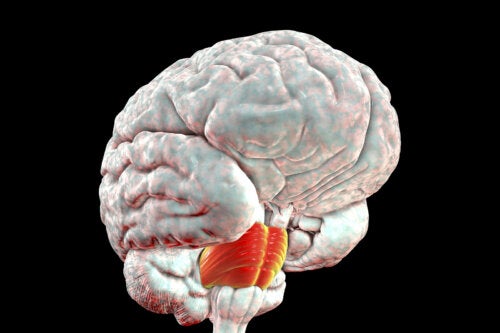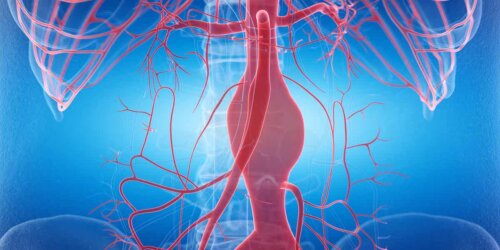Properties of Ginkgo Biloba

Ginkgo biloba, also known as “the tree of longevity”, is a species that doesn’t belong to any family with living specimens, which means that it’s the only member of its kind. Find out about the properties of ginkgo biloba in this article.
Its origin is Chinese and it can offer many benefits to those who consume it, either as a supplement or an infusion.
If you want to know the characteristics and the alleged health properties of ginkgo biloba, read on! However, you should keep in mind that this is only a supplement and can never replace the treatment prescribed by a professional, who you should visit if you think you may have a health problem.
Ginkgo biloba characteristics

Its literal translation from Chinese is “silver apricot”, although it’s also called “white fruit”. Ginkgo biloba is a very popular tree in Asia and can grow up to 35 meters high (115 feet), with thick branches and light green leaves in the shape of a “fan”. In this part of the world, there are specimens up to 2500 years old.
Over the centuries, this tree has had several uses in traditional Chinese medicine, all passed down from generation to generation. In addition, it’s marketed for decoration purposes in gardens, as it’s a hardy tree that can withstand various climates.
Discover more here: Learn How to Make and Care for Bonsai Trees
Properties of ginkgo biloba

For years, this species has been used for therapeutic purposes and, although there’s no conclusive data surrounding its properties, even today its leaves are used in herbal medicine. Let’s have a look at its main uses in natural medicine and see whether there’s any scientific basis for them.
Ginkgo Biloba, an ally for our memory
This plant is often used in the elderly, as it’s believed that it can help to treat problems of irrigation to the brain. These problems could, in turn, lead to a lack of memory, confusion, depression or anxiety.
Although several investigations reported improvements in memory associated with the consumption of ginkgo, a study of 8 years coordinated by the University of Pittsburgh concluded that the intake of 120mg of this plant twice a day was not effective in reducing the incidence of Alzheimer’s in older people.
In conclusion, there’s still no conclusive data to confirm that ginkgo biloba is good for the treatment of Parkinson’s disease, Alzheimer’s, or senile dementia.
Complement against brain and heart problems

Ginkgo biloba contains flavonoids, substances that, according to data from a 2018 study, could help prevent cardiovascular and neurodegenerative diseases, by increasing blood perfusion and reducing the agglomeration of platelets, helping to reduce the risk of thrombosis.
Therefore, ginkgo biloba is often used for the recovery of patients with strokes or heart attacks. However, we reiterate that this data isn’t conclusive evidence.
You may also be interested in: Things to Expect During Post Stroke Rehabilitation
Other benefits

To conclude this section, we’d like to mention that natural medicine claims that the leaves of this tree allow the blood to circulate better to the heart, legs, and arms, offering more vitality and movement to the limbs. However, more research is needed.
Also in relation to blood circulation, it’s believed that it could help sex lives, as it could help increase desire, improve erections in men and sensitivity in women. However, as before, there’s no research to back up these claims.
Finally, some say that it could be good to help those who are suffering from depression, helping them to feel in a better mood.
Contraindications of ginkgo biloba
We’ve already seen that the properties of ginkgo biloba, when used as a supplement, could be quite far-ranging. However, before starting to take it, you should consult your doctor. They are in the best position to advise you about its possible benefits for your health.
You should also be careful if you find yourself in any of the following situations, as this plant is not recommended for these people:
- Those who suffer or have recently suffered from uterine, acute gastrointestinal or cerebral hemorrhages, myocardial infarction, high blood pressure, pregnant or lactating women, infants, and young children.
- Diabetics: There have been cases where ginkgo biloba has altered the effects of anti-diabetic drugs, causing adverse reactions. The same applies to patients who, even though they have diabetes, aren’t insulin-dependent, but control the condition with diet and exercise.
- Those who suffer from coagulation problems or are consuming substances that alter this process.
Ginkgo biloba could have interesting properties that may benefit health. However, many of them don’t have any scientific evidence to support them. You should always consult a specialist before starting to take any kind of natural remedy.
All cited sources were thoroughly reviewed by our team to ensure their quality, reliability, currency, and validity. The bibliography of this article was considered reliable and of academic or scientific accuracy.
- Birks, J., & Evans, J. G. (2009). Ginkgo biloba for cognitive impairment and dementia. Cochrane Database of Systematic Reviews. https://doi.org/10.1002/14651858.CD003120.pub3
- Carlson, J. J., Farquhar, J. W., DiNucci, E., Ausserer, L., Zehnder, J., Miller, D., … Haskell, W. L. (2007). Safety and Efficacy of a Ginkgo Biloba-Containing Dietary Supplement on Cognitive Function, Quality of Life, and Platelet Function in Healthy, Cognitively Intact Older Adults. Journal of the American Dietetic Association. https://doi.org/10.1016/j.jada.2006.12.011
- Diamond, B. J., Shiflett, S. C., Feiwel, N., Matheis, R. J., Noskin, O., Richards, J. A., & Schoenberger, N. E. (2000). Ginkgo biloba extract: Mechanisms and clinical indications. Archives of Physical Medicine and Rehabilitation. https://doi.org/10.1053/mr.2000.3840
- Weinmann, S., Roll, S., Schwarzbach, C., Vauth, C., & Willich, S. N. (2010). Effects of Ginkgo biloba in dementia: systematic review and meta-analysis. BMC Geriatrics. https://doi.org/10.1186/1471-2318-10-14
- University of Rochester. Ginkgo Biloba. https://www.urmc.rochester.edu/encyclopedia/content.aspx?contenttypeid=19&contentid=GinkgoBiloba
- National Center of Complementary and Integrative Health. Questions and Answers: Ginkgo biloba for the Evaluation of Memory (GEM) Study. https://nccih.nih.gov/research/results/gems/qa.htm#q1
- Evid Based Complement Alternat Med. 2011; 2011: 164139. Published online 2011 Aug 18. Examining Brain-Cognition Effects of Ginkgo Biloba Extract: Brain Activation in the Left Temporal and Left Prefrontal Cortex in an Object Working Memory Task. doi: 10.1155/2011/164139
- Nutrients. 2018 Dec 1;10(12). pii: E1852. The Effects of Flavonoids on Cardiovascular Health: A Review of Human Intervention Trials and Implications for Cerebrovascular Function. doi: 10.3390/nu10121852.
This text is provided for informational purposes only and does not replace consultation with a professional. If in doubt, consult your specialist.








